|
|
| |
|
| |


SpringerBriefs in
Environment, Security, Development and Peace (ESDP)
A Peer-reviewed Book Series
Edited by
Hans Günter Brauch,
AFES-PRESS, chairman
Free University of Berlin (Ret.)
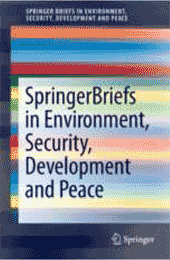 |
Hans Günter Brauch, Ursula Oswald Spring, Juliet Bennett, Serena Eréndira Serrano Oswald (Eds.): Addressing Global Environmental Challenges from a Peace Ecology Perspective. SpringerBriefs in Environment, Security, Development and Peace, vol. 27 (Cham–Heidelberg – New York – Dordrecht – London: Springer-Verlag, 2016)
ISBN (Print): 978-3-319-
ISBN (Online/eBook): 978-3-319-
DOI: 10.1007/978-3-319-
Order Form
Order this book on the Springer Website
Order electronic version and individual chapters |
| |
|
On this book
Addressing Global Environmental Challenges from a Peace Ecology Perspective offers peer-reviewed texts that build on Expanding Peace Ecology and applies this concept to global environmental challenges in the Anthropocene. Hans Günter Brauch (Germany) offers a typology of time and turning points in the 20th century; Juliet Bennett (Australia) discusses the global ecological crisis as resulting from a “tyranny of small decisions”. Katharina Bitzker (Canada) debates “The Emotional Dimensions of Ecological Peacebuilding” by loving nature. Henri Myrttinen (UK) analyses “Preliminary findings on gender, peacebuilding and climate change in Honduras”. Úrsula Oswald Spring (Mexico) offers a critical review of the policy and scientific nexus debate on “The Water, Energy, Food and Biodiversity Nexus” reflecting on the case of security in Mexico. In closing, Brauch discusses whether strategies of sustainability transition may enhance the prospects for achieving sustainable peace in the Anthropocene.
-
Addresses global environmental challenges
-
Focuses on the nexus among biodiversity, water, food, energy and waste
-
Deals with structural violence, the tyranny of small decisions and emotional dimensions of ecological peacebuilding
-
Offers perspectives on sustainable peace by moving towards sustainability transition
Contents
Foreword by Nesrin Kenar, Sec. General, IPRA
Introduction (Hans Günter Brauch – Úrsula Oswald Spring – Juliet Bennett and Serena Eréndira Serrano Oswald) - 2 Historical Times and Turning Points in a Turbulent Century: 1914, 1945, 1989 and 2014? (Hans Günter Brauch) -3 Global Ecological Crisis: Structural violence and the tyranny of small decisions (Juliett Bennett) - 4 Loving Nature: The Emotional Dimensions of Ecological Peacebuilding (Katherina Bitzker) - 5 Drowning in complexity? Preliminary findings on addressing gender, peacebuilding and climate change in Honduras (Henri Myrttinen) - 6 The Water, Energy, Food and Biodiversity Nexus: New Security Issues in the Case of Mexico (Úrsula Oswald Spring) - 7 Building Sustainable Peace by Moving Towards Sustainability Transition (Hans Günter Brauch)
Backmatter: On IPRA and on EPC – On the Editors and Contributors – On the Book
On the Co-editors (of both volumes)
 |
Juliet Bennett (Australia) is a PhD Candidate at the Centre for Peace and Conflict Studies, the University of Sydney. Her research explores an interface between ecology, religion and peace. Juliet has presented her research at international conferences and published papers in academic journals and edited books. She has taught at Lenoir Rhyne University, North Carolina as well as at The University of Sydney. Juliet has been the Executive Officer of the Sydney Peace Foundation since 2012, and in 2014 she became a co-convener of the Peace and Ecology Commission (EPC) of the International Peace Research Association (IPRA).
|
Hans Günter Brauch (Germany), Dr., Adj. Prof. (Privatdozent) at the Faculty of Political and Social Sciences, Free University of Berlin; since 1987 chairman of Peace Research and European Security Studies (AFES-PRESS). He is editor of the Hexagon Book Series on Human and Environmental Security and Peace (HESP), and of SpringerBriefs in Environment, Security, Development and Peace (ESDP) and of the SpringerBriefs ob Pioneeres in Science and Practice with Springer-Verlag, He was guest professor of international relations at the universities of Frankfurt on Main, Leipzig, Greifswald, and Erfurt; research associate at Heidelberg and Stuttgart universities, and a research fellow at Har¬vard and Stanford Universities. In fall and winter 2013/2014 he was a guest professor at Chulanlongkorn University in Bangkok. He published on security, armament, climate, energy, and migration, and on Mediterranean issues in English and German, was translated into Spanish, Greek, French, Danish, Finnish, Russian, Japanese, Portuguese, Serbo-Croatian, and Turkish. Recent books in English: (co-ed. with Liotta, Marquina, Rogers, Selim): Security and Environment in the Mediterranean. Conceptualising Security and Environmental Conflicts, 2003; (co-ed. with Oswald Spring, Mesjasz, Grin, Dunay, Chadha Behera, Chourou, Kameri-Mbote, Liotta): Globalization and Environmental Challenges: Reconceptualizing Security in the 21st Century, 2008; (co-ed. with Oswald Spring, Grin, Mesjasz, Kameri-Mbote, Chadha Behera, Chourou, Krummenacher): Facing Global Environmental Change: Environmental, Human, Energy, Food, Health and Water Security Concepts (2009); (co-ed. with Oswald Spring): Reconceptualizar la Seguridad en el Siglo XXI (2009); (co-ed. with Oswald Spring, Mesjasz, Grin, Kameri-Mbote, Chourou, Dunay, Birkmann), Coping with Global Environmental Change, Disasters and Security – Threats, Challenges, Vulnerabilities and Risks (2011); (co-ed with Scheffran, Brzoska, Link, Schilling).
|
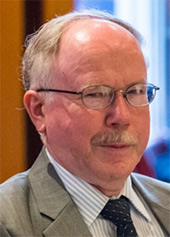
|
| |
|
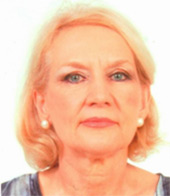 |
Úrsula Oswald Spring (Mexico), full time Professor/Researcher at the National University of Mexico (UNAM) in the Regional Multidisciplinary Research Center (CRIM), she was national coordinator of water research for the National Council of Science and Technology (RETAC-CONACYT), first Chair on Social Vul¬ne¬rability at the United National University Institute for Environ¬ment and Human Security (UNU-EHS); founding Secretary-General of El Colegio de Tlaxcala; General Attorney of Ecology in the State of Morelos (1992-1994), National Delegate of the Federal General Attorney of Environ-ment (1994-1995); Minister of Ecological Development in the State of Morelos (1994-1998). She was President of the International Peace Research Association (IPRA, 1998-2000), and General Secretary of the Latin-American Council for Peace Research (2002-2006). She studied medicine, clinical psychology, anthropology, ecology, classical and modern languages. She obtained her Ph.D. from University of Zürich (1978). For her scientific work she received the Price Sor Juana Inés de la Cruz (2005), the Environmental Merit in Tlaxcala, Mexico (2005, 2006), UN Development Prize. She was recognized as Women Academic in UNAM (1990 and 2000); and Women of the Year (2000). She works on non-violence and sustainable agriculture with groups of peasants and women and is President of the Advisory Council of the Peasant University. She has written 46 books and more than 328 scientific articles and book chapters on sustainability, water, gender, development, poverty, drug consumption, brain damage due to under-nourishment, peasantry, social vulnerability, genetic modified organisms, bioethics, and human, gender, and environmental security, peace and conflict resolution, democracy, and conflict negotiation.
|
| |
|
Serena Eréndira Serrano Oswald (Mexico) is research profes-sor at the Regional Multidisciplinary Research Centre, National Autono-mous University of Mexico (CRIM-UNAM). She holds a PhD in Social Anthropology (UNAM), an MSc in Social Psychology (LSE), an MFT in Systemic Family Therapy (CRISOL), and a BA Hons in Political Studies and History (SOAS). She has a Postdoctorate in Sociology and Gender (UNAM), a professional diploma in translation and interpreting (Institute of Linguists), a specialized training in couples therapy, in psychopathology (CRISOL), and person-centred therapy (Gestalt Institute). Certified by the National Council of Researchers (SNI I), she is currently president of the Mexican Association of Regional Development (AMECIDER).
|
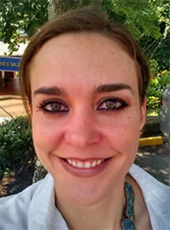
|
| |
|
On the other Contributors
Katharina Bitzker (Germany/Canada) is a medical doctor, body psychotherapist, peace researcher and writer. She received her medical doctoral degree from Humboldt-University Berlin (Germany) and also holds a MA in International Peace Studies from the UN-mandated University for Peace in Costa Rica. Her current areas of interest and research include the interconnectedness of love and peace, the role of poetry, music and humour in conflict transformation, systems theory approaches, and the convergence of neurobiology and peace studies. She is currently pursuing her PhD in Peace and Conflict Studies at the University of Manitoba (Canada).
Henri Myrttinen (Finland/UK) is the Head of the Gender Team of International Alert, a London-based peacebuilding organization. He has been researching, working, teaching, conducting trainings and publishing on gender, especially in the context of post-conflict and conflict-affected societies with and for a range of stakeholders, beneficiaries and target audience for the past 15 years. He holds a Ph.D. in Conflict Resolution and Peace Studies from the University of KwaZulu-Natal, South Africa, with a thesis on masculinities and violence. Other research on gender issues includes examining security sector reform issues, small arms violence, the reintegration of ex-combatants and displaced populations, and prevention of and responses to sexual and gender-based violence from a comprehensive gender perspective. He is the co-author of “Sexed Pistols – Gendered Impacts of Small Arms and Light Weapons” (UNU Press, 2009, with Vanessa Farr and Albrecht Schnabel).
 |
Ursula Oswald Spring, Hans Günter Brauch, Serena Eréndira Serrano Oswald, Juliet Bennett (Eds.): Regional Ecological Challenges for Peace in Africa, the Middle East, Latin America and Asia Pacific. SpringerBriefs in Environment, Security, Development and Peace, vol. 28 (Cham– New York – Heidelberg – Dordrecht – London: Springer International Publishing, 2016).
ISBN (Print): 978-3-319-
ISBN (Online/eBook): 978-3-319-
DOI: 10.1007/978-3-319-
Order Form
Order this book on the Springer Website
Order electronic version and individual chapters |
| |
|
On this book
Regional Ecological Challenges for Peace in Africa, the Middle East, Latin America and Asia Pacific contains peer-reviewed texts from IPRA’s EPC. M.I. Abazie-Humphrey (Nigeria) reviews “The Nigeria Home-Grown DDR Programme”. C. Christian and H. Speight (USA) analyse “Water, Cooperation, and Peace in the Palestinian West Bank”. T. Galaviz (Mexico) discusses “The Peace Process Mediation Network between the Colombian Government and the April 19th Movement”. S.E. Serrano Oswald (Mexico) examines “Social Resilience and Intangible Cultural Heritage: Case Study in Mexico”. A. and F. Rashid (Pakistan) and F. Feng (China) focus on “Community Perceptions of Ecological Disturbances Caused During Terrorists Invasion and Counter-insurgency Operations in Swat, Pakistan”. M. Yoshii (Japan) examines “Structure of Discrimination in Japan’s Nuclear Export”. Finally, S. Takemine (Japan) studies “‘Global Hibakusha’ and the Invisible Victims of the U.S. Nuclear Testing in the Marshall Islands”.
Contents
Foreword: Ibrahim Shaw, Secretary-General, IPRA.
1 Introduction (Oswald Spring, Brauch, Bennett; Serrano Oswald) - 2 The Nigeria Home-Grown DDR Programme (Abazie-Humphrey - 3 Water, Cooperation, and Peace in the Palestinian West Bank (Christian, Fisher, Jackson, Kehoe, Owen, Puleo, Rosner, Speight) - 4 The Peace Process Mediation Network between the Colombian Government and the April 19th Movement (Galvaniz) - 5 Social Resilience and Intangible Cultural Heritage: Case Study in Mexico (Serrano Oswald) - 6 Community Perceptions of Ecological Disturbances Caused During Terrorists Invasion and Counter-insurgency Operations in Swat, Pakistan ( Rashid, Feng, Rashid) - 7 Structure of Discrimination in Japan’s Nuclear Export (Yoshii) - 8 Overlooked Invisible Victims of the U.S. Nuclear Testing in the Marshall Islands (Takemine) - 9 Reflections on Moving Toward Ecological Civilization and Positive Peace (Bennett).
Backmatter: On IPRA and on EPC – On the Editors and Contributors – On the Book
On the Contributors
Margaret Ifeoma Abazie-Humphrey (Nigeria) is a Principal Reintegration Officer at the Office of the Special Adviser to the President on Niger Delta (OSAPND), former Programme Coordinator of the Nigeria Women’s Trust Fund (WF) and former Community Mediator of Perth & Kinross Community Mediation, Scotland, UK on dispute resolution. She was Programme Convener of Peacebuilding Consult, Abuja Nigeria responsible for the gender advocacy design for NGOs working on women affected with conflicts and trauma, on social justice and women empowerment. She received an MSc Econ in Social Development Planning & Management, University of Wales, Swansea UK, had further trainings at American University, Washington DC; Eastern Mennonite University, Va.; Bergen Summer Research School, Norway; University of the Basque Country, Spain; and the Institute of Social Studies, The Hague, the Netherlands. In April 2015, she chaired the Local Organizing Committee of the Africa Peace Research and Education Association (AFPREA) Conference.
Charles Christian (USA) works at a DC-based non-profit to support efforts for sustainable peace in the Middle East and North Africa. He received a Bachelor of History from Trinity University in San Antonio, Texas (2008) and a Master of Arts in International Peace and Conflict Resolution from American University in Washington, DC (2013). This research was carried out as a part of his graduate studies. His current independent research focuses on identity politics in the Arabian Peninsula.
Feng Feng (China) is currently a professor and renowned researcher at the School of Management, University of Science and Technology of China. He received his Ph.D. from Nanjing University in 1999. Prof. Feng’s current research interests include: public policy and management, and crisis management. Prof. Feng has authored more than 80 research papers, many of which have been reproduced by XinHua Digest, and two published monographs. Besides, he has presided over 11 research projects at provincial and ministerial levels and has participated in four research projects.
Tania Galaviz (México) is a professor in the Humanities Faculty at the Autonomous University of the State of Morelos (UAEM) and coordinates the institution’s civil society outreach through its Direction of Civilian Rights-Outreach Secretariat. Among her major publications are:
Audil Rashid (Pakistan) is Assistant Professor and Group Leader of EcoHealth Research (since 2007) at the Department of Environmental Sciences, PMAS Arid Agriculture University, Rawalpindi. Trained as Environmental Biologist, he received M.Phil and Ph.D degrees from Quaid-i-Azam University, Islamabad followed by post-doctorate from Peking University, China. He has a wide range of research interests including health risk assessment, urban health, ecological management and peace ecology. Dr. Rashid is on review panel of many reputed journals, and has presented his work at various international conferences. He has deep understanding of regional peace ecology issues and through his research work, he is highlighting Health – Environment dimensions of conflicts resolution.
Fakhra Rashid (Pakistan) currently holds a Ph.D Fellowship jointly offered by Chinese Academy of Sciences (CAS) and The World Academy of Sciences (TWAS). She is working in the School of Public Affairs, University of Science of Technology of China. To her credit is research experience of EcoHealth project (2011-2013) in which she worked as Research Assistant in Department of Environmental Sciences, PMAS Arid Agriculture University, Rawalpindi, Pakistan.
Heather Speight (USA) works as a research scientist with the United States Army Corps of Engineers, Engineer Research and Development Center, Geospatial Research Laboratory in Alexandria, Virginia. She is a licensed Professional Engineer in the State of California with a Bachelor of Science in Civil Engineering from the University of Dayton in Dayton, Ohio (2002) and a Master of Arts in International Peace and Conflict Resolution from American University in Washington, DC (2013). This research was carried out as a part of her graduate studies. Her current research focuses on the nexus between the environment, peace, and climate variability.
Seiichiro Takemine (Japan) is an adjunct associate professor at Meisei University in Tokyo. PhD (International Studies: Waseda University). Co- convener of a research committee on Global Hibakusha and the board members of Peace Studies Association of Japan. Conducted filed research about the nuclear issues in the Marshall Islands since 1998. His major written works is [マーシャル諸島 終わりなき核被害を生きる] [Still Living with Nuclear Fallout in the Marshall Islands] (Tokyo: Shinsen sha, 2015 in Japanese).
Michiko Yoshii (Japan), Bachelor of French Literature at Kyoto University in 1981, Master of Vietnamese Studies at Paris VII University in 1991, Ph. D. of International Studies at The University of Tokyo in 2007. Worked as French-Japanese Interpreter, Commercial Director of a Japanese trading company in HCMC, Long-term assigned expert of JICA in Vietnam and Professor of Mie University, Japan. Actually, Professor in Faculty of Humanities, Okinawa University. Her main work: Yoshii, Michiko. 2009, “Citizens and NGOs standing up in Vietnam – Case of care activities for street children”, Akashi Shoten, Tokyo (in Japanese).
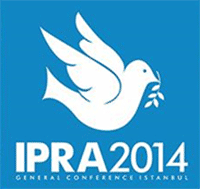
On International Peace Research Association (IPRA)
Founded in 1964, the International Peace Research Association (IPRA) developed from a conference organized by the "Quaker International Conferences and Seminars" in Clarens, Switzerland, 16-20 August 1963.The participants decided to hold international Conferences on Research on International Peace and Security (COROIPAS), which would be organized by a Continuing Committee similar to the Pugwash Conferences. Under the leadership of John Burton, the Continuing Committee met in London, 1-3 December 1964. At that time, they took steps to broaden the original concept of holding research conferences. The decision was made to form a professional association with the principal aim of increasing the quantity of research focused on world peace and ensuring its scientific quality.
An Executive Committee including Bert V A. Roling, Secretary General (The Netherlands), John Burton (United Kingdom), Ljubivoje Acimovic (Yugoslavia), Jerzy Sawicki (Poland), and Johan Galtung (Norway) was appointed. This group was also designated as Nominating Committee for a 15-person Advisory Council to be elected at the first general conference of IPRA, to represent various regions, disciplines, and research interests in developing the work of the Association.Since then, IPRA has held 25 biennial general conferences, the venues of which were chosen with a view to reflecting the association's global scope. IPRA, the global network of peace researchers, has just held its 25th General Conference on the occasion of its 50th anniversary in Istanbul, Turkey in August 2014 where peace researchers from all parts of the world had the opportunity to exchange actionable knowledge on the conference broad theme of ‘Uniting for sustainable peace and universal values’.
The 26th IPRA General Conference will take place between November 28 and 1st December in 2016 in Freetown, Sierra Leone on the theme: AGENDA FOR PEACE AND DEVELOPMENT: Conflict prevention, post-conflict transformation, and the Conflict, Disaster and Development Debate.
On IPRA <http://www.iprapeace.org/>
On the IPRA Foundation <http://iprafoundation.org/>
International Peace Research Association (IPRA) Conferences,
Secretary Generals and Presidents 1964-2016
IPRA General Conferences
|
IPRA Secretary Generals/Presidents |
- Groningen, the Netherlands (1965)
- Tallberg, Sweden (1967)
- Karlovy Vary, Czechoslovakia (1969)
- Bled, Yugoslavia (1971)
- Varanasi, India (1974)
- Turku, Finland (1975)
- Oaxtepec, Mexico (1977)
- Königstein, FRG (1979)
- Orillia, Canada (1981)
- Győr, Hungary (1983)
- Sussex, England (1986)
- Rio de Janeiro, Brazil (1988)
- Groningen, the Netherlands (1990)
- Kyoto, Japan (1992)
- Valletta, Malta (1994)
- Brisbane, Australia (1996)
- Durban, South Africa (1998)
- Tampere, Finland (2000)
- Suwon, Korea (2002)
- Sopron, Hungary (2004)
- Calgary, Canada (2006)
- Leuven, Belgium (2008)
- Sydney, Australia (2010)
- Mie, Japan (2012)
- Istanbul, Turkey (2014)
- Freetown, Sierra Leone (2016)
|
1964-1971 Bert V. A. Roling (the Netherlands)
1971-1975 Asbjorn Eide (Norway)
1975-1979 Raimo Väyrynen (Finland)
1979-1983 Yoshikazu Sakamoto (Japan)
1983-1987 Chadwick Alger (USA)
1987-1989 Clovis Brigagão (Brazil)
1989-1991 Elise Bouding (USA)
1991-1994 Paul Smoker (USA)
1995-1997 Karlheinz Koppe (Germany)
1997-2000 Bjørn Møller (Denmark)
2000-2005 Katsuya Kodama (Japan)
2005- 2009 Luc Reychler ( Belgium)
2009-2012 Jake Lynch (UK/Australia), Katsuya Kodama (Japan)
2012-2016 Nesrin Kenar (Turkey), Ibrahim Shaw (Sierra Leone/UK) |
Presidents
The first IPRA President was Kevin Clements (New Zealand/USA, 1994-1998).
His successor was Úrsula Oswald Spring (Mexico, 1998-2000).
|
On IPRA’s
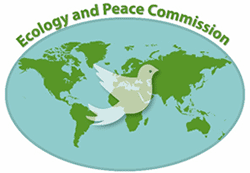
IPRA’s Ecology and Peace Commission (EPC) addresses the relationship between the Earth and human systems, and their impacts on peace. A special focus is placed on the linkages between problems of sustainable development and sustainable peace. The EPC evolved from the Food Study Group, which became Ecology and Peace Commission (EPC). In 2004 an Earth Charter Working Group was also set up. Many wars have been related to resource conflicts and therefore the EPC focused on conflict resolution related to sustainable development and processes of sustainable transition toward ecological civilization.
The conveners are elected by the participants during IPRA conferences for a two year period to prepare the publications for the past conference and to prepare the sessions for the next conference. The conveners between the IPRA conferences in Mie (2012) and Istanbul (2014) were:
-
Úrsula Oswald Spring (CRIM/UNAM, Cuernavaca, Mexico), Full time Professor/Researcher at the National University of Mexico (UNAM) in the Regional Multidisciplinary Research Center (CRIM), lead author of the Intergovernmental Panel on Climate Change (IPCC); Email: <uoswald@gmail.com>.
-
Hans Günter Brauch (Free University of Berlin (ret.), Peace Research and European Security Studies [AFES-PRESS], Mosbach, Germany); Chairman, Peace research and European Security Studies (AFES-PRESS), nonprofit scientific society, Mosbach, Germany (see biography as coeditor); Email: brauch@afes-press.de;
-
Keith G. Tidball (Cornell University, Ithaca. NY, USA), Senior Extension Associate in the Department of Natural Resources where he serves as Associate Director of the Civic Ecology Lab and Program Leader for the Nature & Human Security Program. New York State Coordinator for NY Extension Disaster Education Network; Email: <kgtidball@cornell.edu>.
Based on the presentations of the IPRA conference in Mie (November 2015) they published this peer-reviewed book
In August 2014 in Istanbul the conveners between the IPRA conferences in Istanbul (2014) and in Freetown (2016) were elected:
-
Prof. Dr. Úrsula Oswald Spring (CRIM/UNAM, Cuernavaca, Mexico)
-
PD Dr. Hans Günter Brauch (Free University of Berlin (ret.), Peace Research and European Security Studies [AFES-PRESS], Mosbach, Germany)
-
Juliet Bennett, PhD candidate (Centre for Peace and Conflict Studies, The University of Sydney Australia); Email: <juliet.bennett@sydney.edu.au>.
Based on the presentations of the IPRA conference in Istanbul (August 2014) they published these two peer-reviewed books:
-
Hans Günter Brauch, Úrsula Oswald Spring, Juliet Bennett, Serena Eréndira Serrano Oswald (Eds.): Addressing Global Environmental Challenges from a Peace Ecology Perspective. SpringerBriefs in Environment, Security, Development and Peace, vol. 27. Peace and Security Studies No. 4.
-
Úrsula Oswald Spring, Hans Günter Brauch, Serena Eréndira Serrano Oswald, Juliet Bennett (Eds.): Regional Ecological Challenges for Peace in Africa, the Middle East, Latin America and Asia Pacific. SpringerBriefs in Environment, Security, Development and Peace, vol. 28. Peace and Security Studies No. 5
For the 2016 IPRA Conference the EPC conveners suggest to devote several sessions to the following themes:
-
Sustainability Transformation and Sustainable Peace
-
Developing what? Critical perspectives on sustainable development goals
-
Envisioning and moving toward an environmental civilization
-
Connections between human wellbeing and the wellbeing of the planet
-
Effects of conflict on environment, and solutions
-
Mitigating and adapting to climate change in a peaceful way
-
International Environmental Policy: motivating political will and implementation
-
Holistic approaches to structural violence, connecting issues such as population, gender, poverty, environment, culture, food, water, energy, agriculture, education and economics
-
Additional submitted papers related to environment and peace
It is again planned to publish selected papers as a special issue of a peer-reviewed scientific journal or in a book in this book series. In close consultation and coordination with the two co-conveners, Ursula Oswald Spring and Hans Günter Brauch, the session at the IPRA conference in 2016 will be coordinated by:
-
Juliet Bennett, PhD candidate (Centre for Peace and Conflict Studies, The University of Sydney, Australia); Email: <juliet.bennett@sydney.edu.au>.
-
Prof. Dr. Úrsula Oswald Spring (CRIM/UNAM, Cuernavaca, Mexico)
-
PD Dr. Hans Günter Brauch (Free University of Berlin (ret.), Peace Research and European Security Studies [AFES-PRESS], Mosbach, Germany)
|
|
|